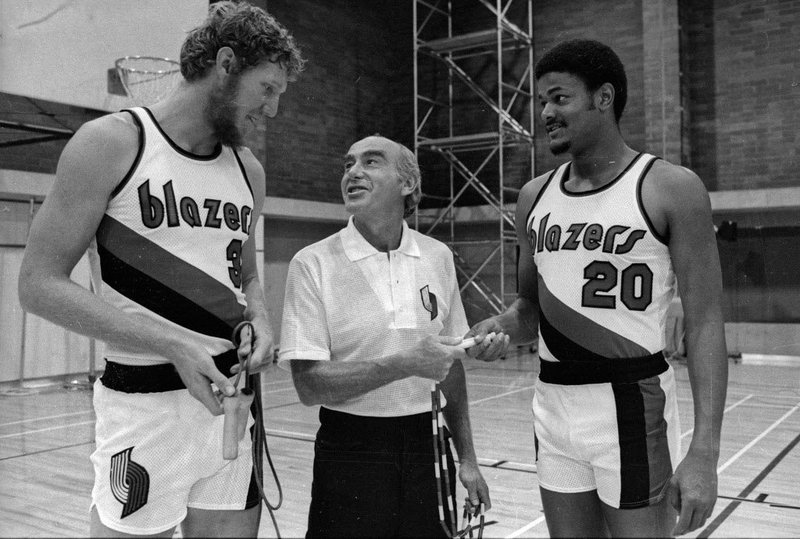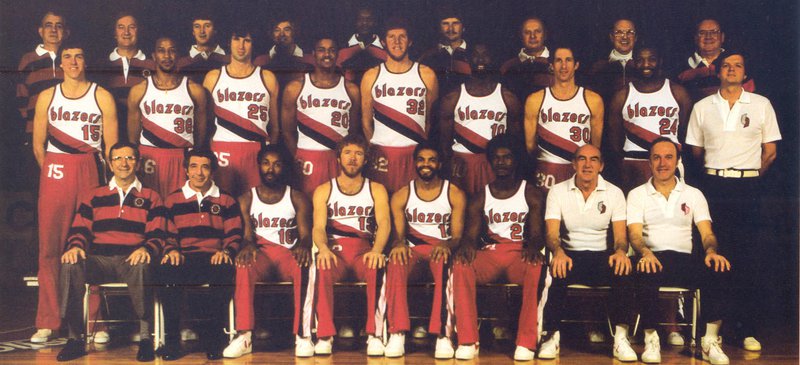
Maurice Lucas (1952-2010)
Maurice "The Enforcer" Lucas, according to Jack Ramsay
Maurice Lucas was born in Pittsburgh, where he was an outstanding basketball player at Schenley High School and was recruited by Coach Al McGuire to play at Marquette University. Lucas led the Marquette Warriors to the NCAA Finals in 1974 and was drafted by both the NBA (Chicago) and the ABA (The Spirit of St. Louis). Lucas chose to play for the Spirit, where he became an All-Star player. He was later traded to the Kentucky Colonels shortly before the ABA folded at the end of the 1975–1976 season. Portland acquired Lucas by trading guard Geoff Petrie and forward Steve Hawes to Atlanta for the Hawks’ pick (Lucas) in the ABA dispersal draft.

Walton, Ramsay, and Lucas, courtesy Maurice Lucas Foundation
Soon after the Blazers acquired Lucas, I arranged to meet him at a summer basketball camp run by Dave Bing in the Pocono Mountains of Pennsylvania where Lucas was on staff. Luke had established himself as a tough, no-nonsense, intimidating force in the ABA—an image solidified when, playing for St. Louis, he knocked Kentucky’s Artis Gilmore to the floor with one punch. Since Gilmore was recognized as the strongest player in all of basketball at the time, Lucas’s strong-man reputation was already established in the NBA before he stepped onto the floor.
My perception of Portland teams of the past was that they lacked physical toughness, and I wanted Lucas to change that image. So, at my first meeting with Luke, after I outlined the game I wanted him to play, I told him that I wanted him to flaunt the physical reputation he brought with him from the ABA—to bang around opposing players and to instigate confrontations. I told him that the team would pay any fines he incurred in establishing that persona. Lucas liked the idea.
The next time I saw Lucas was when he, Bill Walton, and Herm Gilliam walked into our first team meeting at training camp five minutes late. I watched them take seats, then looked at my watch and said, “Everything starts on time on my team. You three were five minutes late. You’re each fined $5 a minute,” the customary amount at the time. I never had a problem with tardiness again with that group. Larry Steele said many years later at one of the championship reunions that fining the three players “was the first step in the Blazers becoming a championship team.”
At training camp, Lucas and Lloyd Neal had great physical battles for the starting big forward position— each earning the respect of the other. Luke won out. He soon endeared himself to Blazers fans by throwing down a monster game-winning dunk against the Lakers in a pre-season game. The packed house exploded, then chanted “Lu-u-u-ke” in unison for the first of many times during the next few seasons.
Lucas had a great first season with Portland. He led the team in scoring (20.2 points a game) and was second to Walton in rebounding (11.4). He intimidated at least half of the opposing big forwards in the league by delivering a couple of forearm shivers to his match-up as the teams lined up for the opening tip.
Lucas was very effective at the low post, using pump fakes to get open jumpers and drives to the hoop— drawing fouls in the process. He was an excellent outlet passer—fired bullets to point guards Twardzik or Davis, or wingmen Hollins, Gilliam, Gross, or Steele. He and Walton were the best pair of rebounders in the NBA that season, and Lucas was acknowledged to be the league’s top power forward. But most important of all, Lucas was the Blazers’ intimidator. Nobody messed with him…or any other Blazer.
After defeating Chicago, Denver, and the L.A. Lakers in the early 1977 playoff rounds, Portland found itself in the NBA Finals against the favored Philadelphia 76ers, who had home-court advantage. Lucas looked forward to his match-up against former ABA rival George McGinnis. Luke felt he was the better player and was not happy that McGinnis had a more lucrative contract. The Sixers won the opening game, 107–101, and was leading in Game 2 when the Sixers’ Darrell Dawkins, following a skirmish under the basket, took a swing at Bobby Gross right in front of the Blazers’ bench. The nimble Gross deftly ducked the punch—which hit Doug Collins, Dawkins’ teammate, opening up a cut on Collins’s cheek. Our bench players found the scene quite amusing, which further agitated Dawkins, who continued to rant and challenge anyone wearing Portland red.
Lucas took that challenge personally and came at Dawkins from the side and unleashed a roundhouse right-hand punch that caught Darrell on the side of the head. The two squared off, but although a lot was said no other blows were thrown. After a few wild minutes, order was restored and both players were ejected. Philly went on to win the game handily, 107–89, giving them a 2–0 lead in the series. Philly fans were jubilant, and the Philadelphia media, sensing a championship, heaped praise on Coach Gene Shue and his team. The Sixers’ self-confidence was palpable.
But back in Portland before Game 3, at a jam-packed Memorial Coliseum, Lucas, instead of joining his teammates when introduced, ran toward the Sixers team and grabbed Dawkins by the hand and wished him good luck. Dawkins appeared stunned by Luke’s action and said nothing. The Portland fans went wild, and the Blazers were soon off and running. Lucas scored 27 points, pulled down 14 rebounds, and passed for 5 assists in that game, won by the Blazers, 129-107. The momentum in the series had suddenly changed. Lucas’ pre-game gesture had much to do with it. 5 Jack Ramsay (1925-2014) was the coach for the Portland Trail Blazers from 1976 to 1986 and steered the team to its first (and only) NBA Championship in 1977. He earned his PhD in Education from the University of Pennsylvania (1963).
The Blazers played even better in Game 4, routing the Sixers 130–98 to even the series, 2–2. Buoyed by the confidence gained in the two blowout wins in Portland, the Blazers withstood a fourth-period Sixers rally to also win Game 5 in Philadelphia. The Blazers then held on to close out the series in Portland, 109–107, to win the 1977 NBA Championship.
Portland was even better the following year, jumping out to a 50–10 record, but injuries to Walton, Neal, and Gross denied the team the chance of winning back-to-back titles. Lucas played well again, but often appeared distracted by his contractual status and was traded later to the New Jersey Nets in 1980. He also played for New York, Phoenix, L.A. Lakers, and Seattle before closing out his playing career with Portland again in 1988.
Lucas engaged in several successful business ventures in the Pacific Northwest before becoming a coaching assistant at Portland in 1988. He then joined Nate McMillan at Seattle and followed McMillan to Portland in the same role in 2005. Lucas was forced to step away from his coaching chores to battle bladder cancer in 2009.
On June 5, 2010, Luke left me a phone message on the anniversary of the Blazers’ 1977 NBA championship. In a clear, strong voice, he said, “Thirty-three years ago today, Doctor, was the day we’ll always remember.”

Portland Trail Blazers, 1977-1978. OHS Research Lib.
